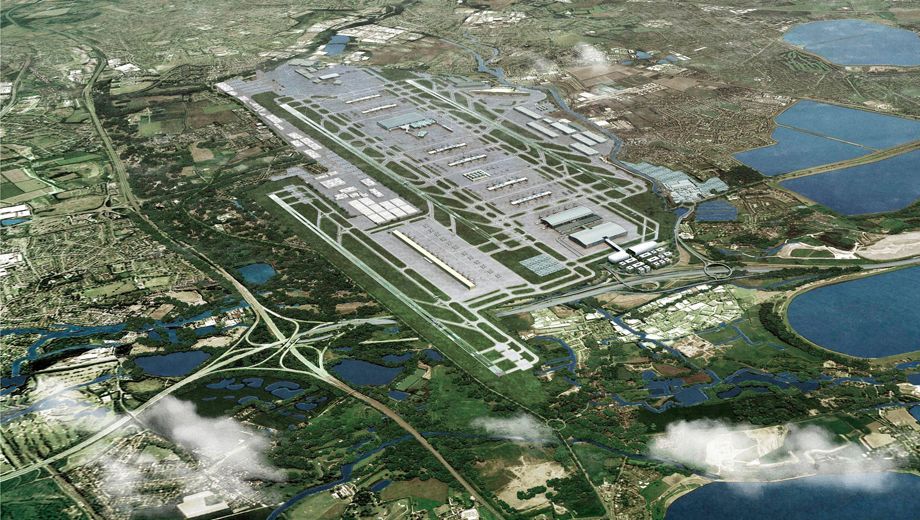London Heathrow's third runway wins backing of Parliament, but not BA

London Heathrow airport’s £16 billion (A$29 billion) expansion plan may have cleared its last major political hurdle, but the project has yet to convince British Airways, the hub’s biggest customer.
After U.K. lawmakers backed the construction of a third runway by 415 votes to 119 late Monday, BA owner IAG responded by saying that the financing arrangements proposed by Heathrow are likely to increase user charges and effectively require present-day passengers to fund future flights.
“Parliament has approved Heathrow’s expansion without any idea of how much it will cost,” IAG Chief Executive Officer Willie Walsh said in a statement.
“We have zero confidence in Heathrow management’s ability to deliver this project while keeping airport charges flat.”
Heathrow CEO John Holland-Kaye said the resounding approval of the government’s national policy statement on airports, which is built around the runway plan, will unlock billions of pounds in growth and create tens of thousands of jobs in the critical years after Britain leaves the European Union.
After decades of delays tied to concerns about extra aircraft noise, increased pollution, the demolition of homes and the impact on roads, construction should finally begin in 2021, he said.
The new landing strip is expected to open in 2025, lifting annual capacity to 135 million travelers from 2017’s 78 million.
"Massive cost escalation" feared
While Heathrow has pledged to keep charges close to today’s level, Walsh predicted “massive cost escalation” for the project in coming years, suggesting that the airport’s future management will distance itself from current commitments.
He called on the Civil Aviation Authority to stop Heathrow “rewarding its shareholders to the detriment of the U.K.”
IAG has previously appealed to the Department for Transport to cap Heathrow’s charges, while lobbying the CAA to create competition within the airport by allowing terminals to be run by third parties. It argues that most U.S. facilities are owned or leased by airlines, as are some sites in Europe.
Heathrow says it has already shaved £2.5 billion from the cost of expansion by switching to a sloping runway over London’s M25 orbital motorway to minimize tunneling work, and staggering the construction of terminal infrastructure as more flights are added.
Transport Secretary Chris Grayling said at the start of the House of Commons debate that all five of London’s main airports will be full by the mid 2030s.
Heathrow itself has been operating close to capacity since the start of the decade, though a switch to bigger planes as airlines seek to make of the most of each departure has allowed it to squeeze in more passengers.
Heathrow trumps Gatwick, Thames Estuary
Enlarging Heathrow is also “absolutely crucial to the U.K. as a whole,” Grayling said, with some businesses already switching to rival hubs Frankfurt, Amsterdam, Paris, which have made additional capacity provision.
The parliamentary vote removes the final political hurdle to Heathrow’s growth, three years after a state-appointed commission concluded that the plan offered greater strategic and economic benefits than a second runway at London Gatwick or an entirely new airport in the River Thames estuary, as championed by Boris Johnson, now foreign secretary, who missed the vote.
Cabinet ministers approved Heathrow’s expansion earlier this month and a committee of lawmakers backed it in March, while saying more should be done to address issues including air quality, regional connectivity, noise and community compensation, as well as financing.
Including the runway plan in a national policy statement will help minimize further procedural logjams, with planning authorities confined to considering elements of the proposal rather than whether it should be built at all.
To be sure, Heathrow’s vision still faces further challenges, with London Mayor Sadiq Khan, who had backed expanding Gatwick, saying last week he’d join with local councils to seek a judicial review if the parliamentary vote approved the new runway.
While that could delay the project, it’s unlikely to block it, since the review mechanism weighs the lawfulness of how a government decision was reached rather than whether it’s right or wrong.

05 May 2016
Total posts 616
Greater capacity for flights at Heathrow would be a good thing. Hopefully it'll mean QF is able to do more flights to/from LHR than it would otherwise and/or get better timings for its flights
British Airways - Executive Club
24 Jan 2012
Total posts 74
QF already have four slot pairs at LHR. They rent 2 to BA, so don't need a new runway to operate more flights. They simply choose not to.
05 May 2016
Total posts 616
But an additional runway may perhaps enable them to get better slot times, I guess.
Qantas - Qantas Frequent Flyer
11 Dec 2017
Total posts 50
QFs strategy with LHR is to maintain the bare minimum capacity to meet demand (as opposed to NA for instance where they’re happy to bring as much capacity as they can afford), in fact with the QF9 swap - seats to LHR are down ~25%.
18 Jan 2017
Total posts 51
21 Sep 2012
Total posts 49
Its fine saying extra passengers but what about the facilities inside the terminal, they barely seem capable of coping with the current amount of passengers if my experience in T5 a couple of weeks ago is anything to go by!
05 May 2016
Total posts 616
There are plans for a new terminal or a terminal extension I think. T3 which QF uses is meant to be demolished. Surely they'd adjust the plans for this to suit what they'll need with the new runway.
Qantas - Qantas Frequent Flyer
22 Jul 2015
Total posts 219
Its a real scrum in T5 and the lounges there are packed also.
Qantas - Qantas Frequent Flyer
12 Jun 2011
Total posts 148
IAG benefit from constrained capacity as they hold most of the current slots. More capacity means more slots available to competitors.
30 Jul 2015
Total posts 104
Exactly, something BA and IAG DO NOT WANT!!
04 Dec 2017
Total posts 68
God help LHR. It already takes up to 45 mins to clear customs on arrival at busy times...and that's using premium 'fast track' !
Virgin Australia - Velocity Rewards
13 Jan 2015
Total posts 580
Something nobody seems to mention is the road infrastructure. The surround motorways are already gridlocked...where are these extra 50 million annual pax supposed to go when they arrive/depart? Slightly irrelevant pie-in-the-sky idea time - imagine if they made the M25 double decked like how they do in other countries.
Qantas - Qantas Frequent Flyer
04 Dec 2012
Total posts 38
Take the train - or trains. Plethora of options, which are only going to increase with Crossrail/Elizabeth line and future HS2. Whoever's dumb enough to drive into London deserves the traffic at this point.
Virgin Australia - Velocity Rewards
13 Jan 2015
Total posts 580
That's all well an good to say that but taking the train with 5 people (incl. children) and a heap of luggage is completely impractical. Also just because people fly into LHR doesn't mean they're staying in London. Just because it suits you to get the train doesn't mean it suits everyone.
16 Nov 2011
Total posts 580
I’ve never been delayed by customs but yup Inmigration has always been a nightmare and getting worse by the day. Like you took me 45 minutes to get through last week in the fast track lane.
04 May 2018
Total posts 43
HAL has already agreed it will put up its charges and ticket prices will rise - at the same time it moves out of the UK to the EU. So you lucky pax you will be paying directly for the new runway, motorway bridges, tunnels next to the current tunnel and all the other additions it has plans for to spend your money!
Air New Zealand - Airpoints
12 Jul 2016
Total posts 27
04 May 2018
Total posts 43
Oh forgot, sound reductions for another 100,000 homes, buying up a village of 1000(?) houses, rebuilding the major west London incinerator and relocating and re-building BA hq.
Hi Guest, join in the discussion on London Heathrow's third runway wins backing of Parliament, but not BA